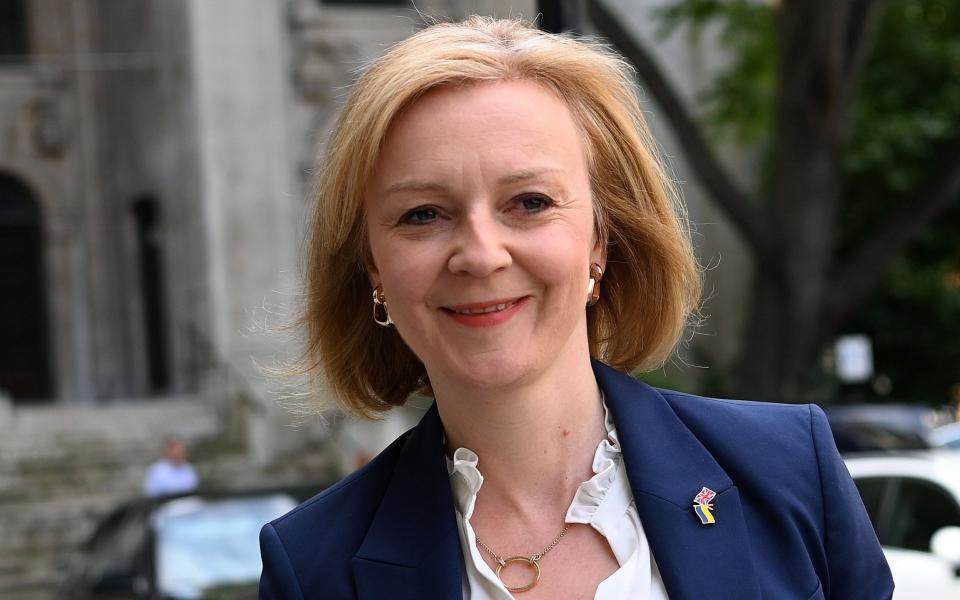I’ll make wolf-whistling and cat calling illegal, says Liz Truss

Repeated wolf whistling and cat-calling will be made a criminal offence, Liz Truss has said as she pledges a major crackdown on misogyny if she becomes Prime Minister.
The Foreign Secretary has unveiled plans to overhaul the way police deal with abuse in public places by creating a new stand-alone criminal offence for street harassment.
It would cover a range of offences from leering and intrusive staring to more serious crimes such as sexual propositioning and indecent exposure, The Telegraph understands.
Under existing guidance for police, street harassment offences are covered by a range of different laws such as the Criminal Justice Act or the Public Order Act of 1986 which outlaws intentional harassment, alarm or distress.
But Ms Truss plans to simplify the guidance for police officers by creating a new offence which explicitly deals with different categories of street harassment.
A campaign source said the new criminal offence would seek to clamp down on "serious offences against of street harassment including kerb crawling and persistent verbal harassment of a sexual nature".
They added that they would work with charities, the CPS and police on "exactly where to set the bar" but said that it would be aimed at tackling repeated rather than isolated incidents of wolf whistling.
Compulsory training would be rolled out for police officers to ensure they can deal appropriately with victims.
“In those awful situations where people are victims of crime, the response from police officers is vital,” a spokesman for her campaign said.
“That is why we will ensure police officers benefit from compulsory training and the tools they need to respond effectively to vulnerable victims.”
National domestic abuse register
Ms Truss also pledged to deal with domestic abusers like sex offenders, by setting up a new national register.
She said she would create a national domestic abuse register for anyone convicted of domestic abuse, including coercive and controlling behaviour and financial abuse.
Those convicted of domestic abuse offences would be required to inform police, who will oversee the register, of new partners and their children and there will be “hard penalties” for those who fail to do this.
The register will allow police officers to contact people and warn them about their partner’s history. It will also enable people to proactively contact the police and ask if their partner appears on the register.
“This will ensure better protection for potential victims of domestic abuse, the majority of whom are women, and break the cycle of repeat offending,” a spokesman for Ms Truss said.
A campaign source told The Telegraph that the register will operate on a “similar principle” to the sex offenders’ register, which keeps track of anyone who has been cautioned or convicted for a sexual offence.
Ms Truss said that violence against women and girls “doesn’t have to be inevitable”, adding: “Over the last two years, our nation has been shocked by a number of high profile murders of women, many here in London,” Ms Truss said.
“It is the responsibility of all political leaders, including us in Westminster and the Mayor of London to do more. Women should be able to walk the streets without fear of harm and perpetrators must expect to be punished.”
She also promised to speed up the processing of rape cases which are “taking too long to progress through the criminal justice system”.
It comes as a senior Tory MP asked Ms Truss to explain why the UK government appeared to have performed a “sudden backtracking on women’s rights” after commitments to abortion women's sexual health rights were removed from an official statement on gender equality.
More than 20 countries signed a statement that resulted from a conference Britain hosted earlier this month. It included a commitment to repeal laws that “allow harmful practices, or restrict women’s and girls’ … sexual and reproductive health and rights, bodily autonomy”. But those phrases were removed from a later version, The Guardian reported.
Caroline Nokes, who chairs the women and equalities select committee, has written to Ms Truss, who is also the minister for women and equalities, to ask why the phrases were deleted.

 Yahoo Sports
Yahoo Sports 